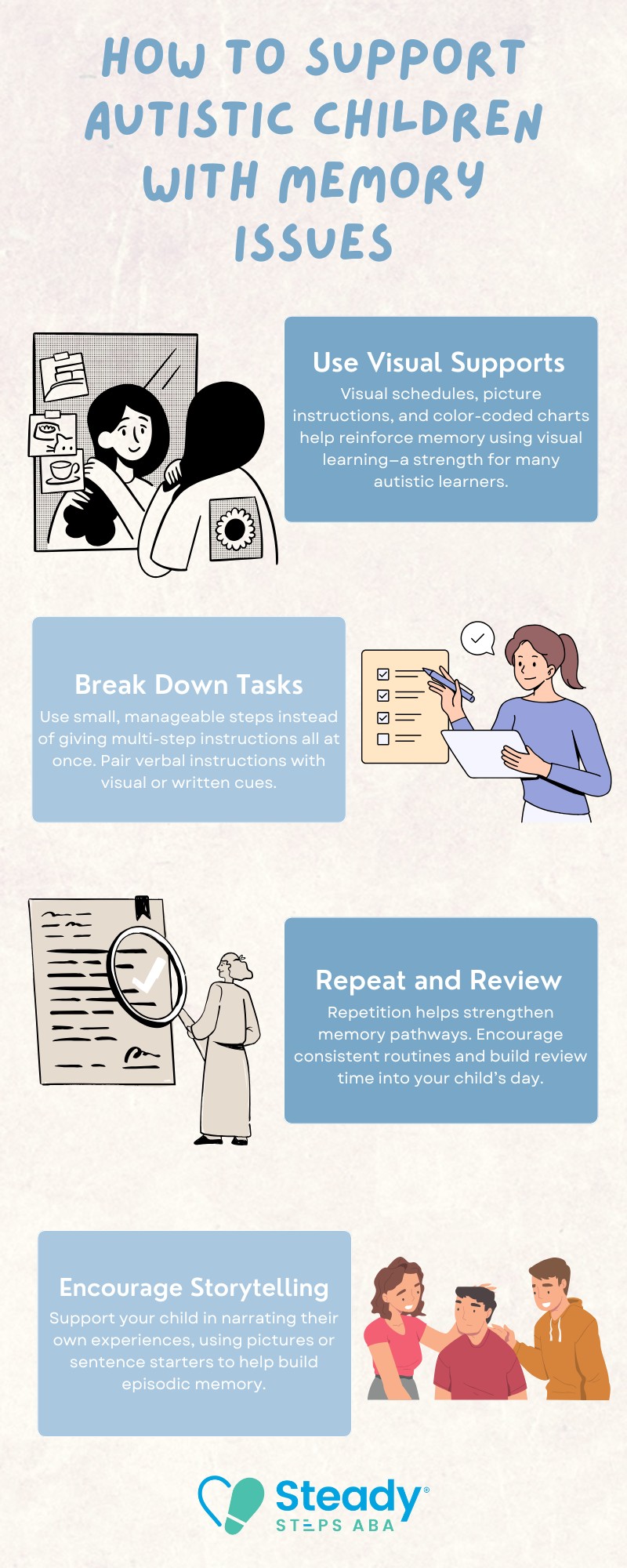Key Points:
- Autism and memory issues are often interconnected, particularly in the areas of working memory and episodic recall.
- Autistic individuals may retain detailed facts but struggle with organizing or retrieving information efficiently.
- Strategies like visual supports, consistent routines, and targeted therapies can help improve memory function.
Memory is essential for daily functioning—from remembering steps in a routine to recalling what happened yesterday. For individuals on the autism spectrum, memory-related challenges can present unique frustrations for both the person and their caregivers.
Autism and memory issues often show up in ways that aren’t always obvious, such as difficulties recalling personal experiences, trouble following multi-step directions, or inconsistencies in what seems to be “remembered.” According to one study, up to 86% of autistic individuals experience one type of comorbid condition, including intellectual disabilities and attention deficit and hyperactivity disorder (ADHD), which can affect memory.
In this article, we’ll explore how memory works in individuals with autism, what kinds of memory challenges are common, and what can be done to support memory development more effectively.
Do Autism and Memory Issues Occur Together?
Yes, individuals with autism may experience memory issues, particularly with working memory, autobiographical memory, and executive functioning. These differences can affect learning, communication, and the ability to carry out daily routines. However, memory in autism is not globally impaired—many individuals show exceptional memory for facts or patterns.
The memory challenges linked with autism are nuanced. While some children and adults may excel at rote memory (like remembering dates or trivia), others may struggle with tasks that require recalling steps, processing new information, or recalling emotional experiences.
What Types of Memory Are Affected in Autism?
Memory is not a single process—it involves various types of recall and information storage. In autism, different types of memory can be affected in different ways. Recognizing these differences helps parents better support their children.
Commonly affected types of memory include:
1. Working Memory
This involves holding and manipulating information over a short period. Children with autism may struggle to follow multi-step directions or solve problems that require mental juggling.
2. Episodic Memory
This refers to the recall of personal experiences, like “what I did yesterday.” Autistic individuals may have difficulty linking emotional context to events, making these memories harder to retrieve.
3. Prospective Memory
This is the ability to remember to do something in the future (e.g., “I need to bring my homework tomorrow”). Forgetting plans or responsibilities can be common.
4. Autobiographical Memory
Children and adults with autism may recall fewer details about their personal lives or have difficulty organizing those memories into a cohesive narrative.
5. Semantic Memory
In contrast, memory for facts, definitions, or learned concepts is often preserved—or even exceptionally strong—in autistic individuals.
Understanding how these types of memory differ can help tailor strategies to each child’s needs.
Why Do Memory Challenges Occur in Autism?
Memory differences in autism are closely linked with how the brain processes and organizes information. Sensory sensitivities, executive functioning deficits, and social processing differences can all influence memory function.
Some children with autism may not encode memories in the same way as neurotypical children do. For example, if a child is overwhelmed by noise during a birthday party, they may not fully register the experience, leading to weaker recall. Other times, they may recall irrelevant details vividly but miss the larger context.

What Do Memory Issues Look Like in Daily Life?
Memory-related challenges in autism can surface in many day-to-day situations. These aren’t always recognized as memory issues at first, which can lead to frustration or misunderstanding. Below are some real-life signs that occur:
1. Forgets Instructions
Children may frequently forget multi-step instructions, even after just hearing them. This can make routines like getting ready, completing schoolwork, or following directions during activities more difficult and frustrating for both the child and the caregiver.
2. Struggles with Recalling Events
Autistic individuals may have trouble summarizing their day or recounting past experiences. This isn’t dishonesty—it often stems from challenges with working memory, sequencing events, or retrieving emotional and contextual details on demand.
3. Forgets Names or Sequences
Names, dates, or order-based tasks—like steps in brushing teeth—can be easily forgotten. These difficulties may appear as carelessness, but they often reflect how the brain stores and retrieves information differently in autism.
4. Inconsistent Recall
It’s common for a child to recall a skill one day and not the next. This variability can be mistaken for defiance or laziness, but it’s usually a sign of uneven memory retrieval under different emotional or sensory conditions.
5. Struggles with Transitions
When moving between tasks or locations, children may forget what they need to bring or do next. This can cause anxiety or outbursts, especially in fast-paced or overstimulating environments like classrooms or busy homes.
6. Needs Frequent Prompts
Even for well-known routines, some children need repeated verbal or visual cues. These prompts help initiate or complete tasks, and their need for them may fluctuate depending on sensory stress, fatigue, or changes in routine.
In school, memory difficulties can show up as incomplete work, misunderstood assignments, or test performance that doesn’t reflect true knowledge. At home, it might mean forgetting chores or events despite frequent reminders.
How Can Parents Support Children With Autism and Memory Issues?
Supporting a child with memory difficulties doesn’t require a complete overhaul—just consistent, supportive strategies that reduce stress and increase structure. These memory aids can be customized to a child’s age, needs, and interests.
Supportive strategies include:

When applied consistently, these strategies can strengthen not just memory but also your child’s confidence and independence.
When Should Parents Seek Additional Support?
If memory challenges begin to impact academic performance, relationships, or everyday independence, it may be time to seek additional help. Assessment from professionals such as developmental pediatricians, neuropsychologists, or ABA therapists can help pinpoint specific memory-related issues.
ABA (Applied Behavior Analysis) can play a critical role in teaching memory-enhancing behaviors. Therapists can create personalized strategies that reinforce routines, task sequencing, and recall skills in ways that match your child’s learning style.
How Memory Strengths Can Be Used Positively
Autistic individuals often have unique memory strengths, such as strong rote memory, detail retention, or intense focus on topics of interest. These can be harnessed for learning, daily routines, and building confidence when supported properly.
For example, a child who remembers specific facts about animals or trains can use that interest to engage in academic tasks. Visual schedules, songs, or consistent patterns tap into memory strengths, making transitions and routines smoother.
When caregivers and educators build on these areas of strength, they not only improve skill development but also boost the child’s sense of competence and motivation.
Create Meaningful Change With ABA Therapy
If your child is struggling with memory, attention, or executive function challenges related to autism, support is available. At Steady Steps ABA, we provide evidence-based, individualized ABA therapy in Maryland to help children strengthen skills that promote independence, including memory, communication, and task completion.
Our trained therapists work closely with families to create routines and strategies that improve memory recall and reduce frustration. Whether your child is just beginning their autism journey or needs help with daily life skills, we’re here to help.
Contact us today to learn how we can support your child’s growth, confidence, and memory development—one small step at a time.






